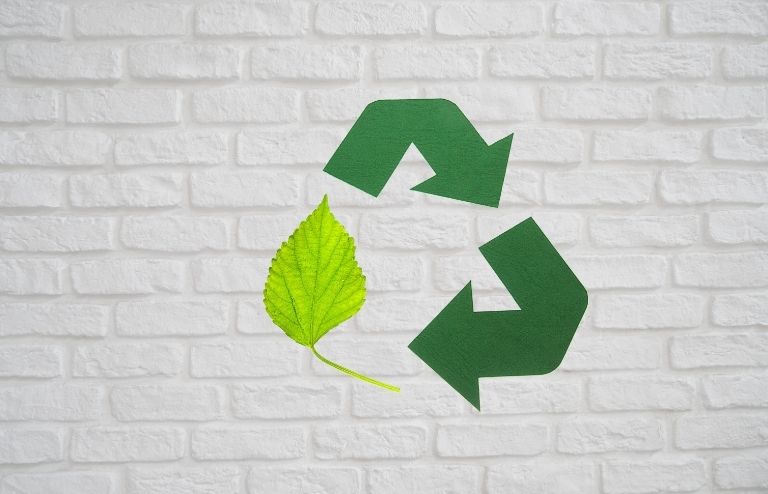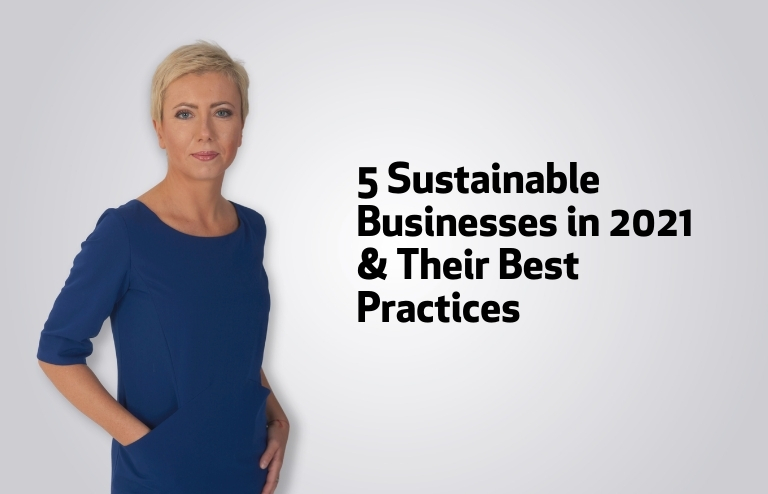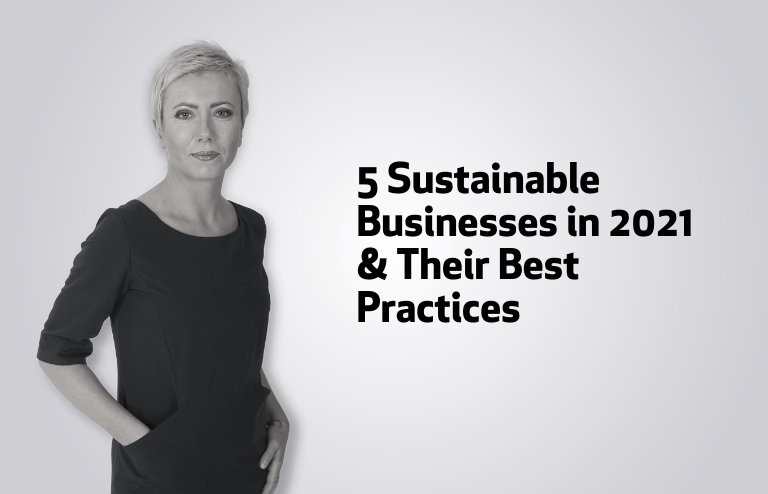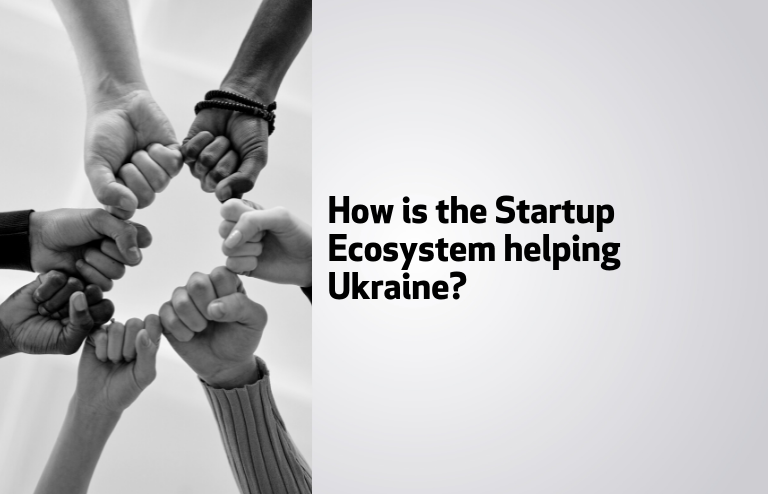This article was created in cooperation with Joanna Pydo, C-Suite Advisor, Investor Relations, ESG
In today’s business world, being responsible for environment and society is no longer an optional extra. When it comes to the attributes we value in companies, sustainability is moving higher and higher. This list of sustainable businesses covers 5 of the best companies promoting sustainability both inside and out.
Defining The Most Sustainable Companies
Before we begin, let’s be clear on what a sustainable business is. What lies at the heart of sustainably conscious companies?
A sustainable business is an organization or company that has minimal negative impact on the environment and society. This is often reviewed in three key areas:
- Social. This covers labour and other personal rights.
- Environmental. The company’s direct impact on the environment, both locally (such as internal operations) and globally (such as the supply chain).
- Economical. Of course, any sustainable companies still need to be successful for their initiatives to bear fruit.
While many focus on the second factor, especially in consumer-based markets, it is the combination of all three that essentially distinguishes responsible companies out from the rest. Any company can be financially viable after all, but it’s the active desire to reduce one’s own impact or better yet, generate a positive effect that is essential.
This can be reflected in many ways, from carbon neutral goals to reduce emissions, to more proactive approaches to remove waste material or emissions throughout supply chains.
Sustainable Business and Society
Yet this is also where the social value is often felt the most: by educating and incentivising others (both within the company and its partner networks to the public at large), organizations take direct proactive action with long term goals in mind.
The best environmentally focused companies are organizations that invest heavily in greener materials and practices at every level of the organization level, production process, making tough decisions now to for a greater future that’s more beneficial for all. They’re either actively involved in governmental targets, goals and schemes, or creating their own internal programs that are just as impactful.

5 companies with sustainable business practices
There are many ways to measure sustainable practices, but there’s no one defining metric; that’s why every sustainable businesses list is a little different. The companies included here are of our choice, considering the changes they’ve already made, are currently making and the impact they’ve had both internally and externally.
Top sustainable companies, such as the 5 mentioned here, don’t make token gestures. They go above and beyond what is required to set a new standards for their peers.
Synthos
The Synthos Group, headquartered in Oświęcim, Poland, is one of the country’s largest producers of raw chemical products, such as synthetic rubber.
The Group is one of the industrial pioneers which has incorporated Sustainable Development Goals and a Circular Economy philosophy not only into their strategy, but also directly into practice. Synthos’ products have the necessary properties to enable recycling and “closing the loop”. In particular, their expanded polystyrene (EPS) and extruded polystyrene (XPS) products are easily recognizable and separable.
However, what marks the organization as an environmentally and societally responsible company is its commitment to meeting international guidelines and actively taking part in ongoing endeavours to meet future targets. Alongside working with the European Commission, the group is a member of the Agenda 2030 Stakeholders National Forum, a Polish Initiative, and Operation Clean Sweep, established by the American Chemistry Council and designed to prevent plastic from contaminating the environment by proactive, rather than reactive, means.
These are just some of the initiatives the enterprise is involved in, but it’s clear that they don’t shy away from active engagement, even outside of their home territory.
The Synthos Group extends sustainability values to its entire supply chain. In 2019, the company stated 90% of the local foamed-polystyrene producers it cooperates with have already signed up to Agenda 2030, and it continues to encourage all partnering companies to take a more active involvement. In this way, it spreads its Circular Economy model, and the sustainable benefits therein, as far as possible.
Mondi
While based in Addlestone, United Kingdom, the Mondi organization operates in over 30 countries, with approximately 100 production sites. As a significant global producer of plastic and paper packaging solutions, Mondi is arguably one of the most recognizable sustainable companies for its simple motto: “paper where possible, plastic when useful”.
However, Mondi’s initiatives go beyond this. Even when plastic is a necessary option, the company considers greener options, such as the continued development of post-consumer recycled plastics.
While not as actively involved as the likes of Synthos, Mondi’s own 2030 action plan is built with the challenges of their own industry in mind. There is a strong drive for “circular driven solutions” to reuse materials as much as possible. This, combined with a focus on forestry and empowering internal teams, marks Mondi’s inclusions among companies with best sustainability practices. Paper, as a renewable resource, already has strong sustainable benefits, but Mondi consider the wider consequences of mass deforestation, for example, and have practices in place to avoid this. They are critically aware of the impact of the business operations and are taking continued actions to introduce more sustainable operations whenever and wherever possible.
Skanska
Based in Stockholm, The Swedish Skanska company provides building and construction materials around the world. It’s inclusion in this list of companies with sustainable business practices is for two reasons: it’s focus on both individual contributions and green building design.
Let’s start with the latter. Skanska often leads the way in green design, with a history of recognition for its efforts. Most notably, it was the first company to meet ISO 14000 standards across all locations. This standard, aimed at reducing industrial waste and environmental impact, marks Skanska as something of a forerunner in corporate responsibility.
As for development, Skanska encourages everyone to cycle more and choose green alternatives where possible. This is best seen in the UK’s Supply Chain Sustainability School, aimed to educate and encourage construction suppliers throughout the industry. While numerous companies are actively involved, Skanska was a founding member.
All of the above, however, is just part of Skanska’s target of achieving net-zero carbon emissions by 2045, not just within the company’s own facilities, but throughout its value and supply chains. Considering the achievements already made, this earns its place among the best and most successful companies with sustainable business practices.
3M
The 3M company is vast. As a manufacturer, the American organization produces 60,000+ products across worker safety, adhesives, laminate materials, protective equipment, health care supplies and more. Many of these are sold under specialist names, but all can be considered environmental friendly brands thanks to 3M’s extensive efforts.
3M has a long standing commitment to sustainability and its goal is to achieve carbon neutrality, reduce water use, and improve water quality.
In 1975, 3M launched their 3P (Pollution Prevention Pays) program, at a time when such sustainability concepts were rare. More than saving money, 3M have notably decreased their global emissions and eliminated much waste generation from their production processes.
Today, these initiatives extend into all areas of the enterprise, including concept and design. Since 2019, any new 3M product requires a Sustainability Value Commitment. This commitment covers the products lifecycle and subsequent environmental impact, covering the likes of reusability and recyclability, potential waste reduction, responsible outsourcing and the use of renewable materials where possible.
Like the other companies focused on sustainability here, 3M also strives to achieve carbon neutrality and a global circular economy, favouring recycling over new resources whenever possible. Since 1975, they’ve gotten closer and closer to that goal.
This, combined with their public efforts and Sustainability Value Commitment, enable 3M to push forward in sustainability, as well as transparency with their customers around the world.
LPP
LPP might stand out from the others on this list. While the others focus on industrial sectors, this Polish retail giant, which owns brands such as Reserved, House, Cropp, Mohito and Sinsay, operates at a consumer level, yet it’s green initiatives mark it as one of the best companies that sell green products in the international fashion sector.
So what marks LPP as such a great environment friendly business? Under its own Eco Aware program, the company aims to ensure 25% of its products are fully produced through sustainable means by the end of 2021. These Eco Aware products use organic materials and recycled fibres. More than this, such products are actively highlighted in-store, allowing consumers to make real, eco-friendly choices.
Even the hangers and materials used in non-commercial goods are also recyclable, and many of LPP’s stores in Poland also include donation boxes to drop off unwanted clothing, to be donated to charitable causes, along with any unsold goods. In this way, combined with similar practices for unsold clothing, LPP encourages sustainable behaviour in its own customers as well.
It’s this visible effort and clear transparency across all brands that marks LPP as one of the top environmentally responsible companies. The fact that this information is advertised at the product-level in store also enables consumers to make better sustainable choices, ensuring both customer and manufacturer are aware of their role in such sustainable practices. As a result, both can make better, fully informed decisions.
Why Companies with Sustainable Business Practices Succeed
More than just the direct benefit on the environment, companies that care about sustainability also benefit from a positive image amongst customers, business partners and investors, are prepared for any changes in environmental law and always strive to be one-step ahead at every stage of their business. With changing attitudes, the most sustainable brands are in a strong position.

Governments, Cooperation & Policy
Globally, we are seeing initiatives, programs and forums around the world focused on climate change or net-zero. Local governments want companies to be sustainably green, so those that are already making the effort are securing their future as well. Whether it’s avoiding fines or political backlash – or even securing grants and incentives – environmentally focused companies stand to gain a lot of favour.
Those that go above and beyond government schemes, however, are securing themselves against continued developments. Such sustainable companies know that the current targets are a stepping stone to further progress and are planning accordingly. It’s no surprise that many of the above sustainable brands have given themselves their own carbon neutral goals between now and a few decades away.
Consumer & Public Image
Policies and politics aside, sustainable business practices are essential for survival in competitive markets.
Likewise, consumers are actively making more and more conscious choices and the need for transparency is increasing. This isn’t just limited to companies that sell green products, either. The average consumer is aware of the carbon footprint of the services they use, or even the wider supply chain of the companies they do business with. It’s arguably why so many industrial giants (and why Skanska, 3M and LPP) are great leaders here.
While they don’t interact with the public at an individual purchasing level, they all focus on both improving standards via educational means and introducing change across their value chains. This in turn impacts a wider network of companies, many of which do interact with the public directly.
Today’s customers expect the businesses they choose to, in turn, choose companies that care about sustainability. Those that are more transparent with their practices have a lot to gain from those that aren’t.
Investors
Finally, investors also have to be considered. Given the importance of sustainable business practices for both governments and the public, even investors are actively measuring companies sustainability policies and their efforts.
While this list of sustainable businesses arguably focuses on larger organizations, don’t forget that companies like 3M and LPP all started somewhere and environmental initiatives were introduced relatively early on. In the modern world, there’s no excuse for other up and coming companies to do likewise. To not do so is a liability.
“Being sustainable” is an investment in itself. World policies and opinions are moving more and more towards sustainable practices. From a strategic point of view, it makes sense to be proactive, rather than reactive.
What Can Other Companies Learn?
On that note, what can other businesses learn from The Most Sustainable Companies out there? Here are the most significant lessons to take from the 5 businesses mentioned above.
- Educate. Many of these sustainable businesses go to great lengths to educate their staff, fellow companies and even the public. It’s not enough to simply provide options, but also show others why change is necessary. From a business point of view, this can even mean investing broadly in R&D.
- Make change. Don’t wait for it. There are many public forms and initiatives and, when there aren’t, setting personal goals is still essential. Just ensure these are impactful targets. It’s why companies aim for carbon neutrality: it puts their agenda firmly on a beneficial goal, rather than one that compromises ideals for profits or other short term benefits.
- Work with others. No company operates on its own and, when assessing a carbon footprint, the top companies out there consider all of their decisions. Then, they partner with those businesses to work on new answers together.
- Be transparent. Finally, transparency can’t be ignored. LPP openly advertises which of its products are made with organic or renewable materials, even at the cost of consequently highlighting those that aren’t. Meanwhile, even though they don’t deal with the public at large, Synthos, Mondi, Skanska and 3M hold themselves accountable and openly share information on their processes, practices and overall sustainability. It’s not about marketing: companies with sustainable business practices openly show their efforts.
Even the biggest companies with sustainable business practices don’t make massive changes overnight. However, by being consistently committed and analysing every step for improvements, the companies on this list have already introduced great change inside and out. What’s more, they continue to innovate and push their practices even further.
This article was created in cooperation with Joanna Pydo, one of the MIT Enterprise Forum CEE Mentors.






